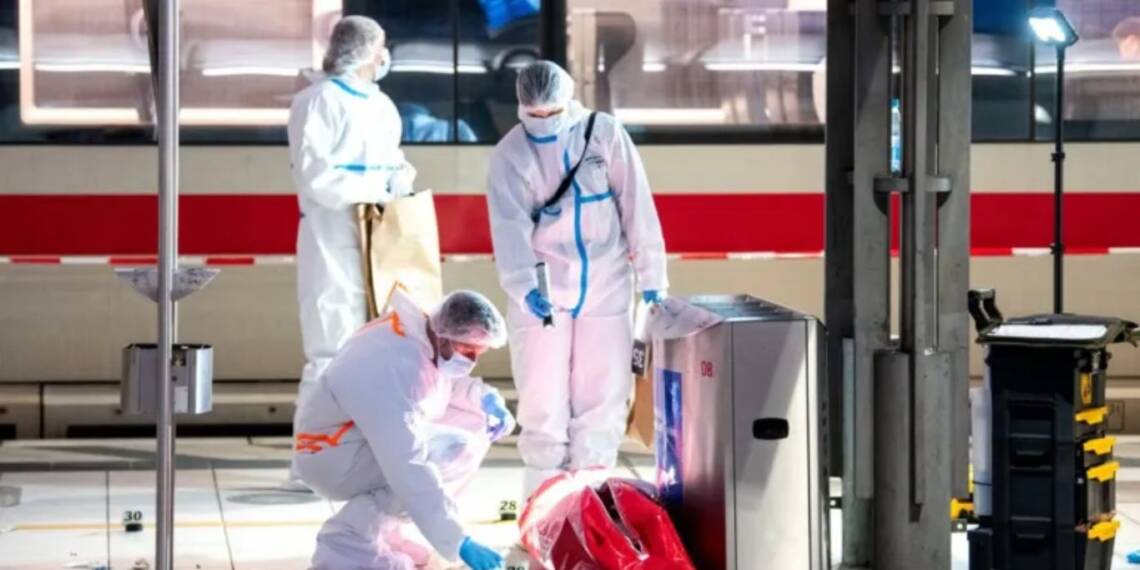At least 17 people were injured, four critically, in a brutal knife attack at Hamburg’s central train station on Friday evening, in what authorities described as a chaotic and violent incident on one of Germany’s busiest platforms.
The attack unfolded around 6 p.m. local time on a crowded platform adjacent to a long-distance train. Witnesses recounted scenes of panic and confusion as a woman began randomly stabbing travelers. According to the Hamburg Fire Department, all victims were quickly transported to nearby hospitals, with emergency services responding within minutes.
A 39-year-old woman has been arrested in connection with the attack. Police say she surrendered without resistance when officers arrived at the scene. Florian Abbenseth, a spokesman for the Hamburg police, said the suspect is believed to have acted alone and may have been suffering from mental distress. Authorities are still working to establish a clear motive.
“The perpetrator is in custody,” confirmed Hamburg Mayor Peter Tschentscher in a statement late Friday. “I wish the victims of the crime much strength and hope that those who are seriously injured will also be able to be saved.”
Germany’s newly elected Chancellor Friedrich Merz extended his condolences to the victims and spoke with Mayor Tschentscher, offering federal support for the investigation and aftermath.
The attack has reignited concerns over public safety, particularly at Hamburg’s central train station, long identified by local police as a high-risk area due to frequent violent incidents. The station has been designated a “weapons-free zone,” allowing for increased police authority and preventive searches.
The Second in a Week
This marks the second major knife attack in Germany this week. On Sunday, five people were wounded outside a bar in Bielefeld, western Germany, in another stabbing incident. Police arrested a 35-year-old man of Syrian origin the following day. According to reports by Der Spiegel, the suspect expressed support for the Islamic State via a translation app and was found in possession of multiple bladed weapons and a bottle of gasoline.
Due to indications of jihadist motives, the investigation into the Bielefeld incident has been taken over by federal prosecutors. The suspect reportedly arrived in Germany in 2023 and had been granted a temporary stay.
Germany has experienced a troubling uptick in violent attacks in recent months, including those driven by extremist ideologies. The dual specters of jihadist and far-right violence have fueled national debates over immigration, integration, and law enforcement. Security concerns were a central theme in the recent federal elections, which saw the conservative CDU/CSU alliance win a majority, while the far-right Alternative for Germany (AfD) gained unprecedented support, surpassing 20% of the vote.
Since December last year, Germany has witnessed at least 9 significant attacks, several of which were linked to ideological motives, especially jihadist. Let’s talk about a few incidents that have happened in recent months.
1. Berlin Holocaust Memorial Stabbing (February 21, 2025)
A 19-year-old Syrian asylum seeker, Wassim al M., attacked a 30-year-old Spanish tourist at Berlin’s Holocaust Memorial, attempting to slit the victim’s throat. The victim sustained life-threatening injuries but survived after emergency surgery. Investigators revealed that the assailant harbored antisemitic motives, expressing a desire to “kill Jews.” At the time of arrest, he was found with a knife, a Quran, and a note containing Quranic verses, indicating a potential religious motivation.
2. Aschaffenburg Park Attack (January 22, 2025)
In a public park in Aschaffenburg, Bavaria, a 28-year-old Afghan man attacked several individuals, killing a two-year-old child and a man, and seriously injuring two others. The suspect was arrested at the scene. His asylum application had been refused in June 2023, and he had a history of criminal proceedings, including serious bodily harm and assault.
3. Magdeburg Christmas Market Car Attack (December 20, 2024)
On December 20, 2024, a 50-year-old Saudi-born doctor, Taleb A., drove a black BMW into a crowded Christmas market in Magdeburg, resulting in six deaths, including a nine-year-old child, and injuring over 200 people. The suspect, who had lived in Germany since 2006 and was recognized as a refugee in 2016, expressed anti-Islam views and sympathies for far-right ideologies. Authorities concluded that the attack was driven by personal frustration rather than terrorism.
4. Solingen Festival Stabbings (August 23, 2024)
During the Festival of Diversity in Solingen, North Rhine-Westphalia, a 26-year-old Syrian refugee, Issa al Hassan, carried out a mass knife attack, killing three people and injuring eight others. The attack occurred at the Fronhof marketplace, a central square in the city. Authorities accused the suspect of being motivated by “radical Islamist convictions,” and the Islamic State claimed responsibility for the attack. His asylum application had been rejected in 2023, but he remained in Germany due to difficulties in deportation.
As investigations into the Hamburg and Bielefeld stabbings continue, Germany finds itself grappling with a complex web of security, social cohesion, and political accountability. While Lone and knife attacks remain high in the nation.








